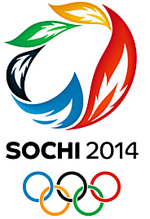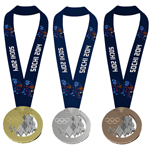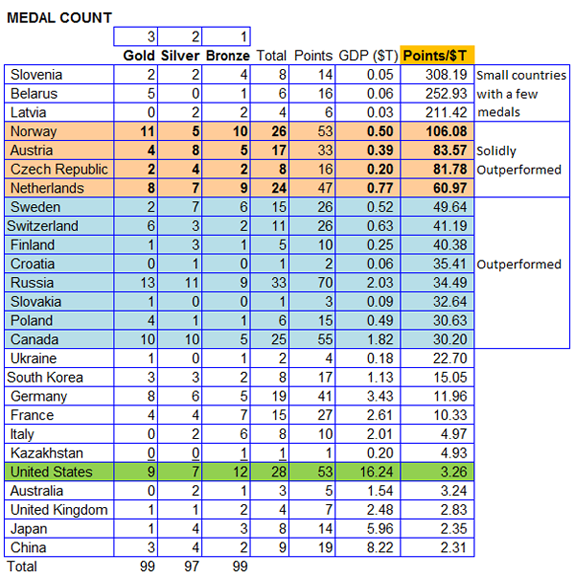|
 Sochi Winter Olympics Analysis Sochi Winter Olympics Analysis
Two years ago I looked at the Beijing Summer Olympics and crunched the
numbers on the results. (See Who Won The Olympics?) In 2012 there was
a high correlation between GDP and performance: the R-squared was 0.60,
meaning that 60% of a country’s
performance could be tied to GDP. My hypothesis was two-fold: (1) having
more people helps because standout athletes are rare,
and (2) greater wealth allows for more investment in training.
Conveniently, population x per capita income = GDP, and it was gratifying
to see that explain so much of the results. As the Sochi Winter Olympics
finished up last Sunday, I was eager to see how the theory held up.
The answer: not so well. The R-squared dropped to 0.11. Why? I have some
thoughts.
|
1.
|
Some
countries specialize.
 While every country can find athletes for the 100
meter dash because every country has track and field competitions, that
isn’t true for the events in the winter games. I couldn’t find a
consistent data source to track average temperature or latitude with
results, but the results are solidly Eurocentric,
and Northern Europe at that. Consider Norway, where Wikipedia reports
that while “football” (sorry, we’re not talking NFL so I’m pulling out
the quotation marks) is the most popular sport in terms of active
membership, the most popular televised sports are biathlon,
cross-country skiing, and then football. Is it any surprise that a
small group of countries dominates these events when they are the only
ones to focus on them? This is different from Jamaicans outperforming
in sprinting or Kenyans outperforming in the marathon because not
everyone has the right facilities, and GDP doesn’t necessarily get you
those items. There are only 17 bobsled tracks in 11 countries in
the world. All nine medals were won by those countries. Latvia—who does
have a track and won a silver—would outperform
all but five countries on a GDP basis with that medal alone. India’s
Shiva Keshevan trained on a Himalayan highway. He
came in 37th. While every country can find athletes for the 100
meter dash because every country has track and field competitions, that
isn’t true for the events in the winter games. I couldn’t find a
consistent data source to track average temperature or latitude with
results, but the results are solidly Eurocentric,
and Northern Europe at that. Consider Norway, where Wikipedia reports
that while “football” (sorry, we’re not talking NFL so I’m pulling out
the quotation marks) is the most popular sport in terms of active
membership, the most popular televised sports are biathlon,
cross-country skiing, and then football. Is it any surprise that a
small group of countries dominates these events when they are the only
ones to focus on them? This is different from Jamaicans outperforming
in sprinting or Kenyans outperforming in the marathon because not
everyone has the right facilities, and GDP doesn’t necessarily get you
those items. There are only 17 bobsled tracks in 11 countries in
the world. All nine medals were won by those countries. Latvia—who does
have a track and won a silver—would outperform
all but five countries on a GDP basis with that medal alone. India’s
Shiva Keshevan trained on a Himalayan highway. He
came in 37th.
|
|
|
|
|
2.
|
 Tight competition favors small countries. Imagine a
situation where every competitor is equally talented, and there are 30
competitors representing ten countries. Someone will pull off a monster
day and win the gold. So will that person be from a big country or a
small one? Consider that China and India have over 1/3 of the world’s
population, but they can send the same number of competitors as Latvia.
Normally we expect that the Chinese competitors will be better since
they were the best three out of 1.3 billion people. But in highly
competitive events, maybe having more entrants increases your chances
of winning more than having an athlete who has finished the course 0.06
seconds faster on her best day. Tight competition favors small countries. Imagine a
situation where every competitor is equally talented, and there are 30
competitors representing ten countries. Someone will pull off a monster
day and win the gold. So will that person be from a big country or a
small one? Consider that China and India have over 1/3 of the world’s
population, but they can send the same number of competitors as Latvia.
Normally we expect that the Chinese competitors will be better since
they were the best three out of 1.3 billion people. But in highly
competitive events, maybe having more entrants increases your chances
of winning more than having an athlete who has finished the course 0.06
seconds faster on her best day.
|
Still, you have to be impressed with Norway. And some things remain
mysteries.  For
example, why did Norway (pop. 5M) have twice as many medals as Sweden
(pop. 10M)? I’ll keep my eye turned on
this and see if future games bring more insight. For
example, why did Norway (pop. 5M) have twice as many medals as Sweden
(pop. 10M)? I’ll keep my eye turned on
this and see if future games bring more insight.
The data:



|